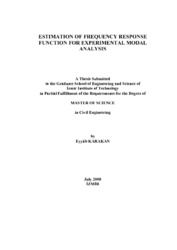Please use this identifier to cite or link to this item:
https://hdl.handle.net/11147/3697Full metadata record
| DC Field | Value | Language |
|---|---|---|
| dc.contributor.advisor | Dönmez, Cemalettin | - |
| dc.contributor.author | Karakan, Eyyüb | - |
| dc.date.accessioned | 2014-07-22T13:52:10Z | - |
| dc.date.available | 2014-07-22T13:52:10Z | - |
| dc.date.issued | 2008 | - |
| dc.identifier.uri | http://hdl.handle.net/11147/3697 | - |
| dc.description | Thesis (Master)--Izmir Institute of Technology, Civil Engineering, Izmir, 2008 | en_US |
| dc.description | Includes bibliographical references (leaves: 125-129) | en_US |
| dc.description | Text in English; Abstract: Turkish and English | en_US |
| dc.description | xii, 129 leaves | en_US |
| dc.description.abstract | Every structural system has unique dynamic parameters based on the mass, stiffness and the damping characteristics. If the system is linear and time invariant, dynamic parameters could be shown to be measured and formulated by the Frequency Response Function (FRF). The study of defining the dynamic parameters of a system thru well designed experiments and analysis is called experiment modal analysis. Experimental modal analysis has two major study areas which are modal testing and modal parameter estimation. FRFs are calculated based on the measured data in modal experiment and it is main input to the modal parameter estimation. Based on the measured/synthesized FRF dynamic parameters of the structures considered could be obtained In this study basics of the experimental modal analysis is studied. The primary objective is to see the effects of various testing and analysis parameters on the synthesis of FRF. This goal is achieved by testing and discussion of several simple structural systems.In the thesis general information about experimental modal analysis is presented.The experiment and the modal analysis results of the of the studied systems, which are simple beam, H-frame, square plate and 2D frame, is presented. Selected parameters that are effective on the FRF synthesis is discussed. These parameters are the attachment of the accelerometers, the tip hardness of the impact hammer and the digital signal processing errors such as leakage, windowing, filtering and averaging. The hammer and accelerometers calibrations will be discussed briefly as well. The results are discussed in order to provide some guidance for understanding the effects of the selected parameters on the FRFs. | en_US |
| dc.language.iso | en | en_US |
| dc.publisher | Izmir Institute of Technology | en_US |
| dc.rights | info:eu-repo/semantics/openAccess | en_US |
| dc.subject.lcc | TA654.15 K181 2008 | en |
| dc.subject.lcsh | Modal analysis | en |
| dc.subject.lcsh | Frequency respanse (Dynamics) | en |
| dc.title | Estimation of Frequency Response Fuction for Experimental Modal Analysis | en_US |
| dc.type | Master Thesis | en_US |
| dc.institutionauthor | Karakan, Eyyüb | - |
| dc.department | Thesis (Master)--İzmir Institute of Technology, Civil Engineering | en_US |
| dc.relation.publicationcategory | Tez | en_US |
| dc.identifier.wosquality | N/A | - |
| dc.identifier.scopusquality | N/A | - |
| item.fulltext | With Fulltext | - |
| item.languageiso639-1 | en | - |
| item.cerifentitytype | Publications | - |
| item.openairetype | Master Thesis | - |
| item.openairecristype | http://purl.org/coar/resource_type/c_18cf | - |
| item.grantfulltext | open | - |
| Appears in Collections: | Master Degree / Yüksek Lisans Tezleri | |
Files in This Item:
| File | Description | Size | Format | |
|---|---|---|---|---|
| T000699.pdf | MasterThesis | 4.54 MB | Adobe PDF |  View/Open |
CORE Recommender
Page view(s)
330
checked on May 12, 2025
Download(s)
160
checked on May 12, 2025
Google ScholarTM
Check
Items in GCRIS Repository are protected by copyright, with all rights reserved, unless otherwise indicated.